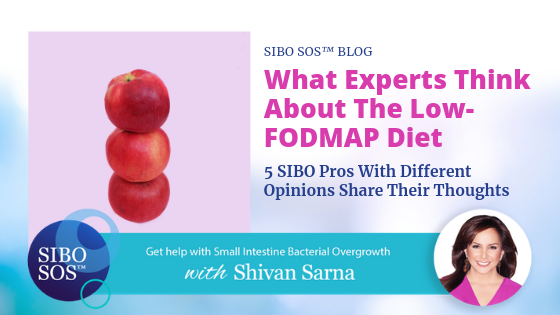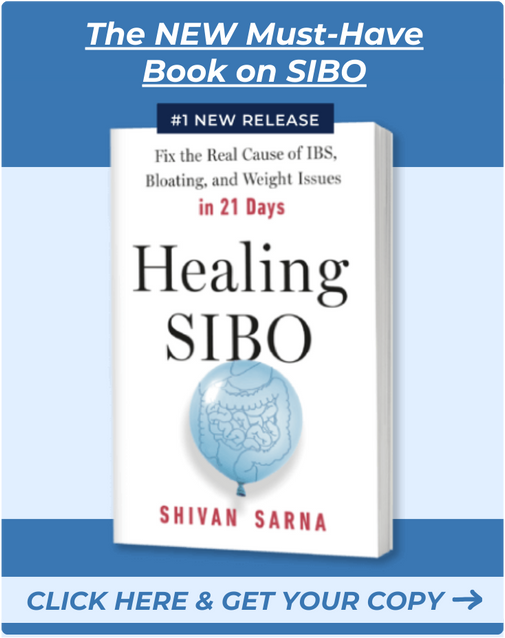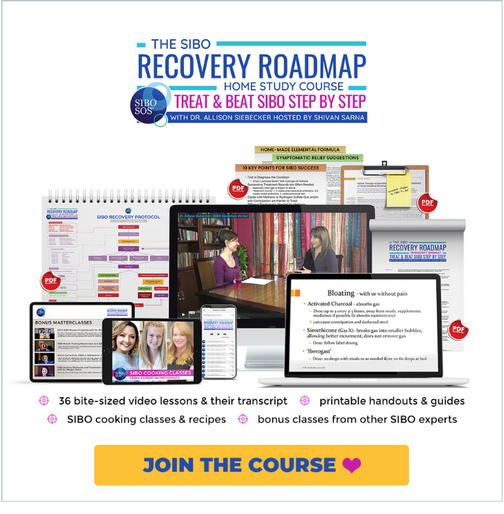 If you have Small Intestine Bacterial Overgrowth (SIBO) or IBS (Irritable Bowel Syndrome) you may have heard of the Low-FODMAP diet.
If you have Small Intestine Bacterial Overgrowth (SIBO) or IBS (Irritable Bowel Syndrome) you may have heard of the Low-FODMAP diet.
It’s a controversial diet plan, and for every practitioner who recommends it, there’s another who doesn’t.
Today, my goal is to share some of these opinions with you so you can make your own decision.
Here are some of the pearls I’ve gathered from deep-dive sessions with SIBO experts over the past 12 months.
Dr.Sheila Dean, DSc, RDN: This Is The Low-FODMAP Diet
Dr. Sheila Dean: “First, let me say that there’s a lot of different approaches to gut health. The FODMAP approach, or the low FODMAP diet approach is a very popular approach just because there’s so much empirical data. There’s so many testimonials to the fact that it works. There’s just so many people that testify to the fact that they do well with fairly limited research.
FODMAP is an acronym. It’s not food map, it is really FODMAP. An acronym that stands for—get ready—fermentable O for oligosaccharides, D for disaccharides…
Disaccharides are basically two sugars—the word di-, the prefix di-, and then the saccharide refers to sugar. When you stick two sugars together, we call that a disaccharides. You might see that in things like milk sugar. Milk sugar is a disaccharide like lactose.
We’ve got, let’s see, fermentable oligasaccharides, disaccharides, M for monosaccharide (which is just “one sugar”), and then P for polyols.
Polyols will be things like sorbitol or manitol (which more people might be a little bit familiar with—you know, you see these things in like sugar-free gum or sugar-free mints and even in some medications where they’re trying to avoid the use of regular sugar or even corn syrup).
When you put that together, F-O-D-M-A-P, FODMAP, that’s how you get the acronym.
A low FODMAP is a 2 to 6 weeks elimination diet, the goal is to remove foods that are considered high FODMAP to assess whether these foods are actually problematic for the person with this altered gut problem like IBS.”
Angela Pifer, Nutritionist: Eating FODMAPs Doesn’t Make SIBO Worse
Angela Pifer: “I think the problem is that, anytime people eat FODMAPs and see a reaction, especially with SIBO, they think SIBO is getting worse. “
Shivan Sarna: “It’s a reasonable assumption.”
Angela Pifer: “It is… but the symptoms are affected, SIBO is not getting worse. On the studies that we look at, three weeks or four weeks, six weeks on a high FODMAP diet, methane does not get worse and hydrogen doesn’t go up. So it’s just the symptoms [that get worse].
The fear is that SIBO is getting worse. They’re going to keep restricting and restricting.
At the SIBO Symposium this year, they had a lovely nutrition track . Half that track was around anxiety around food, fear around food, and eating disorders. I’m not saying that everyone that’s on a FODMAP diet has an eating disorder by any means. When you put somebody on that restrictive of a diet, and they get on that for a long period of time, there’s going to be food fear. It’s going to be disordered eating to a degree because of all of the anxiety being bred.”
Dr. Mark Pimentel, MD: “The Low-FODMAP Diet is Unhealthy”
Dr. Mark Pimentel: “The low FODMAP diet is unhealthy. Now, some of your viewers may not like me saying that. But even those who purport the low FODMAP diet or discover the low FODMAP diet recognize that you have to have a reintroduction phase because it’s going to hurt people over time potentially.
This was presented at the American College of Gastroenterology about a month and a half ago where they showed the people who were sustained on a low FODMAP diet for more than three months started to have measurable nutritional deficiencies.
You can’t stay on low FODMAP forever, period.”
Dr. Michael Ruscio, DC: Don’t Be Scared of Low-FODMAP
Dr. Michael Ruscio: “We learn about how gut bacteria are important, how important it is to feed your gut bacteria and have high levels of diversity.
While all that is true, sometimes, what ends up happening is people hear about the low FODMAP diet and how the low FODMAP diet can starve bacteria, and then they get scared that I shouldn’t go on a low FODMAP diet because it’s going to starve my gut bacteria or cause me to lose gut bacteria and they’re supposed to be so healthy. People are very confused about what to do.
To say it very simply, I would not be concerned at all—no, I shouldn’t say “at all.” I would not be very concerned about a low FODMAP diet impact on your gut microbiota. Let me outline a few reasons why that is.
One, there’s been a few studies [that] essentially found that a low FODMAP diet has the ability to help the serotonin cell density—so the number of serotonin cells that you have in the gut—become more like that of healthy controls.
They took IBS patients, put them on a low FODMAP diet, compared them to patients who were healthy, and they found that patients with IBS had lower levels of serotonin cells in the gut compared to healthy controls. The low FODMAP diet allow those numbers of serotonin cells to become more normal over time. And this is found not only in the large intestine, but also in the small intestine.
Repair Your Intestines with a Low-FODMAP Diet
You may be able to, in part, repair your intestines with a low FODMAP diet through helping to facilitate serotonin cells in your guts—serotonin cells are important for motility, which I’m sure you’ve talked a lot about in the summit—and also for nociception or for pain reception.
Quickly on motility, one of the mechanisms that may cause SIBO is your motility (or the ability of food to move through the intestines) is slowed down. If you don’t have adequate movement, food kind of sticks around, bacteria can grow (just like bacteria can grow in stagnant water, but doesn’t tend to grow in flowing water. Then, you can have SIBO.
One of the things that we see on the low FODMAP diet is a restoration of serotonin cell density which may be helpful.
Now, we don’t have any studies yet that have studied the motility effects of the low FODMAP diet. We can’t fully say that this is translated all the way through to a clinical endpoint. However, at least the initial mechanism data that we have is promising that there is reparative utility to the low FODMAP diet.
But not only that, there’s been at least one study that has shown that leaky gut decreases on a low FODMAP diet, and as I mentioned, before another study showing a decrease in histamine on a low FODMAP diet.”
Rebecca Coomes, SIBO Chef: It’s Not Just About The Food
Rebecca Coomes: “The first mistake or challenge that I see people make and experience is thinking it’s all about food—and only about food. So rather than seeing that your diet and your nutrition is one of many components of recovering your gut health, they just focus on food because it’s one thing we can control as a SIBO patient.
What I see commonly is people get fixated on what they’re eating, or what they’re not eating, a lot of fear creeps in, trepidation around reintroduction of foods.
I myself experienced that. Scared to come off the very restrictive SIBO diet I was on and to start eating other foods. I was terrified of things like bananas. You know, a banana isn’t a bad thing. It’s just perhaps the quantity you ate or the time that you ate it. I didn’t appreciate how what we’re eating and our tolerance to it changes as we go through the SIBO diet. What you can tolerate today doesn’t mean that’s all you will ever, ever tolerate.
And we know that food can be delicious. It’s our life force. It’s our nourishment. If we’re stuck eating the same 5 to 10 foods for years, how can we expect our microbiome to recover and be healthy and diverse? It’s not all about the food.”
Make The Choice That’s Right For You!
As you can see, the experts don’t all agree about low-FODMAP diets,
No two cases of SIBO are the same – which means we all need a customized treatment plan.
There’s no one protocol or diet that works for everyone: healing SIBO is a different path for each of us.
I believe the answer to finding the right path for YOU lies in getting as much information from the experts as we can. Then, we can lean into our own innate wisdom to find what works for us and what doesn’t.
I created the SIBO SOS® Masterclass Summit Series to help bring you ALL the latest information on SIBO – right to your home.
Start watching, reading and listening now – click here.
And I created SIBO Recovery Roadmap®, the most extensive, effective, and personalizable course on SIBO/IMO, to help each SIBO/IMO patient make a plan and follow a nine-step proven algorithm used by SIBO specialist Dr. Allison Siebecker to GET WELL!







8 thoughts on “5 SIBO experts share their opinion on the low-FODMAP diet”
Hi I was recently diagnosed with sibo thanks to you I have low stomach acid can you please tell me what sort of diet you suggest to rebuild the stomach acid thanks Gina
Seems there is no agreement here and no evidence based suggestions – just one expert’s opinion versus another. Not much help here the so called experts for patients with SIBO.
It is simply astonishing that there is total divergence of opinion among so-called experts! How can a food item be a complete no-no for one expert and complete OK for another? Instead of just selling more of the same seminars and programs, it would be far more helpful to provide a small range of food options to help with SIBO and the very difficult symptoms of bloating, etc.
Hi RM,
Food triggers and diets are one of the hardest to figure out because we are all so different. What’s good for you may not be good for me. For instance, as a SIBO patient, I can eat onions and garlic with no problem. While most experts will tell you “NO onions or garlic” because they’re high on the low fodmap list. Try to figure out your food triggers and then use one of the SIBO diets to pick and choose foods that work for you. Diets are not a cure for SIBO. They just help manage the symptoms. Listen to your body and let it guide you as to what you can or shouldn’t eat. If you eat something that flares up the symptoms, put it on the don’t eat list. Working with a nutritionist is helpful.
I’m struck by the near absence of research regarding these dietary recommendations. Even Pimentel, who once recommended the FODMAP diet, or similar versions, now states it is unhealthy long term without a definition of long term. And, if negative symptoms don’t indicate a worsening of SIBO, then is only the lactulose breath test a reliable indicator of how severe SIBO remains? It appears there is very little “science “ associated with dietary prescriptions! I’d like to hear some of these experts whose opinions diverge, debate one another. Who the hell do we believe? We aren’t scientists. We’re just patients who are sick and want a science based road map regarding SIBO and there isn’t one.
Hi Trish,
Thanks for expressing your frustration. There is hope and help! You probably already now this, but just to clarify, the low fodmap doesn’t cure SIBO. It does help manage SIBO symptoms, however. The experts we’ve interviewed recommend no longer than a couple of months depending on your progress and treatment protocol encouraging to introduce as many new foods once you’ve established your trigger foods to diversify the microbiome. It can be highly frustrating, as I have found, to figure out what foods were my triggers. But I only stayed on it for a few weeks, but return to it as symptoms may flare back up. As far as a protocol for SIBO, Dr. Sibo and Shivan have put together a course, SIBO SOS Recovery Roadmap to take you through step by step protocols, treatments and underlying causes to help us save our selves. That’s what SIBO SOS stands for. You can check it out on our website at sibosos.com.
Wish you health.
Karen
SIBO SOS Team member
I am very, very, very appreciative of your work on our behalf and the experts who share their knowledge. Thank you for the reasonable cost of the speaker series.
Hi Sheila,
Thank you so much. So glad you find our information useful and affordable.
Karen